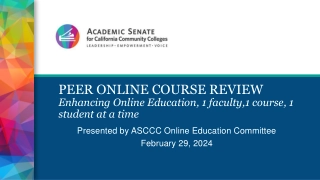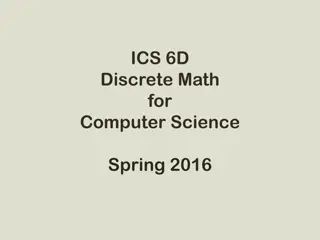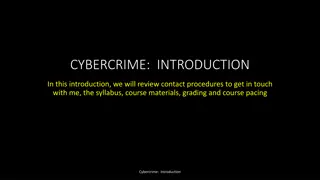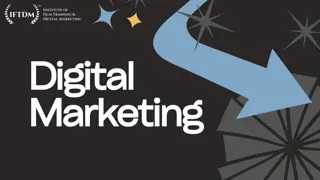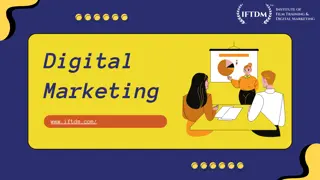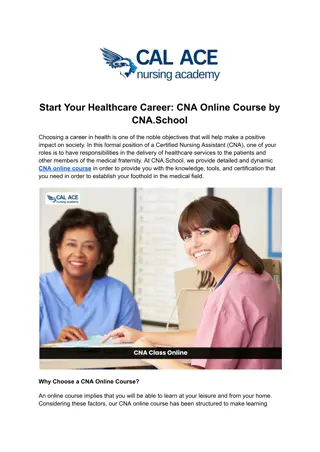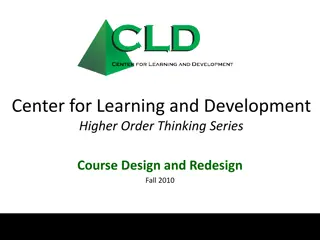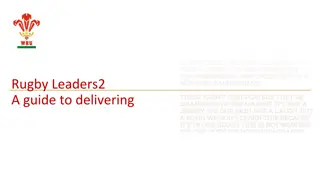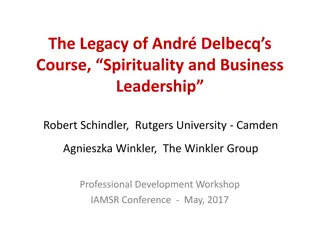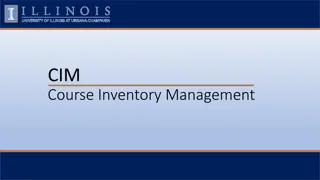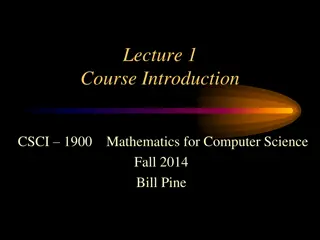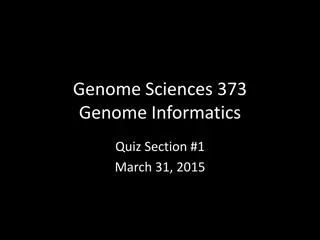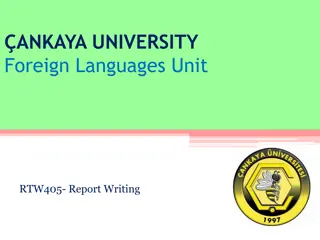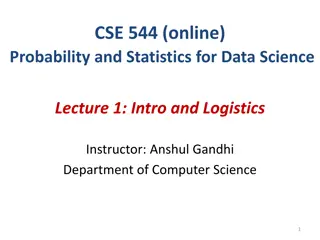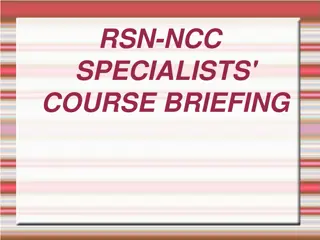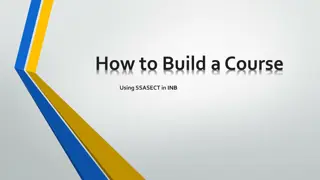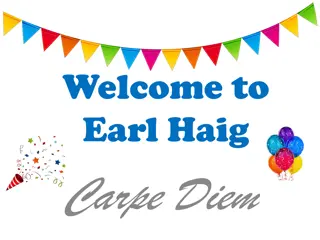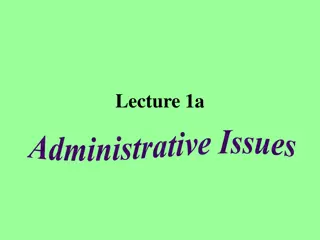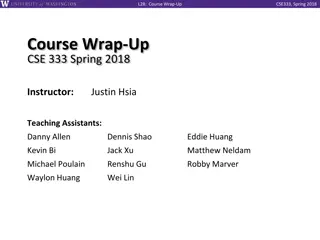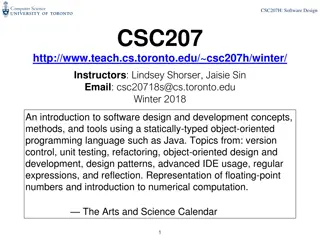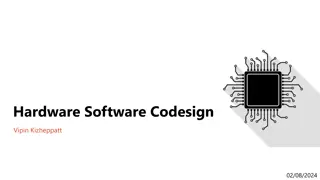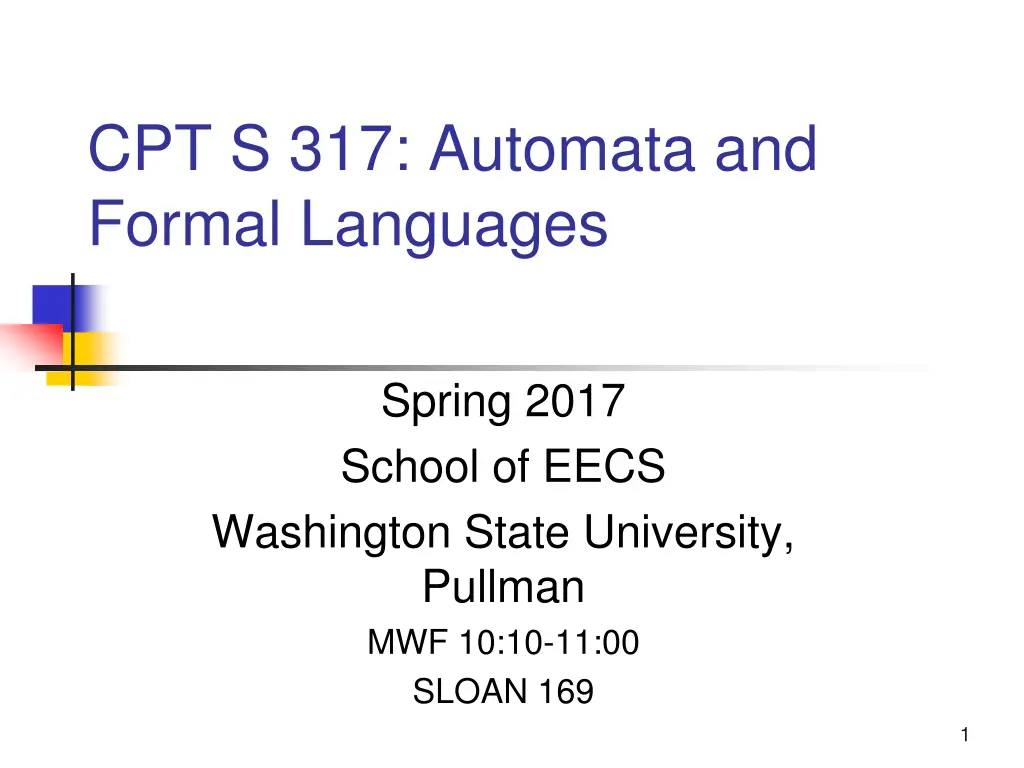
Autonomous Learning - Automata Theory and Formal Languages Course Overview
Explore concepts in automata theory, formal languages, and computational theory in this comprehensive course led by Instructor Ananth Kalyanaraman. Delve into regular languages, context-free languages, Turing machines, and more. Discover the intricacies of grammars, recognizers, and theorems in automata theory. Understand the decidability and intractability of computational problems. Check prerequisites, required textbook, and course webpage for essential resources. Embrace the opportunity to engage with teaching assistants and enhance your understanding through the OSBLE+ web portal.
Download Presentation

Please find below an Image/Link to download the presentation.
The content on the website is provided AS IS for your information and personal use only. It may not be sold, licensed, or shared on other websites without obtaining consent from the author. If you encounter any issues during the download, it is possible that the publisher has removed the file from their server.
You are allowed to download the files provided on this website for personal or commercial use, subject to the condition that they are used lawfully. All files are the property of their respective owners.
The content on the website is provided AS IS for your information and personal use only. It may not be sold, licensed, or shared on other websites without obtaining consent from the author.
E N D
Presentation Transcript
CPT S 317: Automata and Formal Languages Spring 2017 School of EECS Washington State University, Pullman MWF 10:10-11:00 SLOAN 169 1
Instructor Contacts Instructor: Ananth Kalyanaraman (pronounced: An-anth Kal-ya-na-ra-man ) EME 237 ananth@eecs.wsu.edu 335-6760 Weekly Office Hours: Wednesdays 2:30-3:30pm 2
Objectives Introduce concepts in automata theory and theory of computation Identify different formal language classes and their relationships Design grammars and recognizers for different formal languages Prove or disprove theorems in automata theory using its properties Determine the decidability and intractability of computational problems 3
Course Organization Very broadly, the course will contain three parts: Part I) Regular languages Part II) Context-free languages Part III) Turing machines & decidability 4
Teaching Assistants TA1 TBD TA2: TBD Check course website for any updates 5
Pre-requisites CPT S 122/132: Data Structures Math 216: Discrete Structures 6
Required Textbook Introduction to Automata Theory, Languages and Computation By J.E. Hopcroft, R. Motwani, J.D. Ullman 3rd Edition Addison Wesley/Pearson Course book homepage: http://infolab.stanford.edu/~ullman/ialc.html Solutions to starred exercises in the textbook & Errata OSBLE+ (Online Studio-Based Learning Environment): http://plus.osble.org The Gradiance Resource (optional) 7
Course Webpage http://www.eecs.wsu.edu/~ananth/CptS317 Why do I need to check the webpage? Lecture Notes Homeworks will be posted on the webpage A tentative schedule will also be posted and maintained Misc. static information about the course How frequently do I need to keep checking the course webpage? Ideally once every day, and if not at least once before/after each class (for lecture notes) 8
The OSBLE+ Web Portal We will use OSBLE+ for discussions, class announcements, and for email communication with instructor. Every student needs to register in OSBLE+ and should check the portal regularly. All important (dynamic) announcements will be made through this portal. Registration instructions are on the course website. 9
How to get in touch with the instructor and the TA(s)? OSBLE+ (for email and dashboard public discussion forums) Office hours Weekly once preferred way to meet one-on-one No need for prior appointment if meeting during the office hour In addition, the instructor will be available outside of office hours to meet (appointments preferred for this mode). 10
Grading 8 homeworks (60%) - (best 7 policy) 2 midterms (20%) 1 final (20%) Grading Policy: Curved 11
Homework Submission Policy Hardcopy to be submitted in class on the due date Early submissions allowed No late submissions Extensions may be permitted under extraordinary circumstances Contact the instructor at least 1 week prior Homeworks will be posted on the course website 12
Homework Policy All homework must be done individually Cheating: Helping others, getting help, looking up website for solutions, etc. Students caught cheating will be awarded an F grade, and will be subjected to the WSU academic dishonesty policy. If something is not clear, on what constitutes and what does not, please consult the instructor in advance. 13
Exam Policy 2 Midterms and 1 Final exam. Closed book, closed notes, comprehensive Make-ups will be rare and only under extraordinary circumstances Seek prior permission from instructor (at least 2 weeks in advance) 14
Course Schedule A tentative schedule has been posted and will be maintained on the course website Subject to change as course progresses Bookmark & keep checking Recommended frequency: once a week Look for exam schedules as well here 15
Lecture basics Classes will involve both Slides + Board (to roughly equal degrees) Lecture slides available online However, no scribes from class will be made available So, take your own notes in class For latest/updated slides, download before each use Use of laptops and smart phones not allowed in classroom. 16

